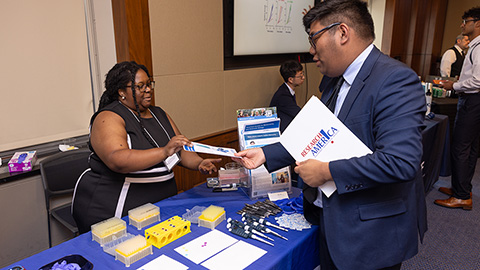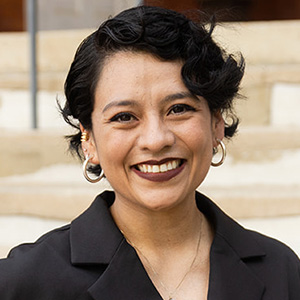ASBMB weighs in on policy changes for dual-use research
The American Society for Biochemistry and Molecular Biology sent feedback on Oct. 16 to the White House Office of Science and Technology Policy about its proposed changes to policy frameworks for dual-use research of concern and potential pandemic pathogen care.
The ASBMB recommended that OSTP:
-
Create tools to aid scientists in determining which research requires additional scrutiny,
-
create measurable outcomes for redefining potential pandemic pathogens, and
-
solicit feedback from the scientific community.
Ann West is the associate vice president for research and development and a professor at the University of Oklahoma. She leads the ASBMB Public Affairs Advisory Committee. “We are advocating for more unified and clear guidance from the various federal agencies … and a multilayer approach to understanding the research community’s concerns prior to implementation,” West said.
Various types of life sciences research are classified as “dual-use” because they can be used to help or harm humanity. Federal and institutional dual-use policies and potential pandemic pathogen care policies cover 15 agents with potential biosafety and biosecurity risks.
The National Science Advisory Board for Biosecurity, a federal advisory committee, released recommendations in March to address biosecurity and dual-use research concerns. Following the board’s recommendations and proposed policy changes, OSTP released a request for information in September with three broad goals:
-
Assess the merger of existing policies into one harmonized policy,
-
expand the scope of pathogens and toxins with the potential to impact humans, and
-
determine ways to strengthen the implementation of oversight throughout the research cycle.
Harmonizing oversight policies
The NSABB proposes merging existing dual-use and potential pathogen policies into one. This would significantly reduce the high administrative burden placed on researchers and academic institutions conducting this type of research. According to the National Science Foundation, principal investigators of federally sponsored projects spend 42% of their time on administrative tasks.
The ASBMB encouraged OSTP to solicit feedback from the scientific community to prevent an increase in administrative burden on scientists and their institutional biosafety committees and to prepare the scientific community for the changes.
Pathogens and toxins requiring review
The NSABB proposes revising the scope of pathogens and toxins requiring review to (1) expand beyond the current 15 select agents and pathogens, (2) redefine potentially pandemic pathogens to include “moderately or highly” transmissible and/or virulent and (3) remove blanket exclusions for select agents and toxins.
Policies and positions
The White House Office of Science and Technology Policy is revising oversight policies for infectious disease-related research.
Read the source material
- Dual use research of concern policies
- Potential pandemic pathogen care policy
-
National science advisory board for biosecurity recommendations
- Office of Science Technology and Policy request for information
ASBMB Public Affairs Advisory Committee member Matthew Koci is a professor of immunology, virology and host–pathogen interactions at North Carolina State University. “The challenge with these kinds of policies is they tend to exist in black-and-white lists, but Mother Nature works exclusively in shades of gray,” he said.
Members of the scientific community have raised concerns that OSTP is overreaching. The authors of an editorial in the Journal of Virology in February warned that “abundant unnecessary review” could significantly slow down science.
The United States Government Accountability Office has expressed concerns about the vague standards in defining pandemic pathogens in current policies, saying that vaccine and surveillance research could be impeded by removing blanket exemptions for agents and toxins.
The ASBMB recommended OSTP:
-
Create tools to aid scientists in determining which agent, toxin or pathogen requires additional scrutiny and the biosafety level required,
-
create clearer definitions and measurable thresholds for defining potentially pandemic pathogens, and
-
involve the scientific community in revising the blanket exclusions with careful consideration of annual updates for seasonal influenza and SARS-CoV-2 vaccines.
Additional considerations
The NSABB also recommends the inclusion of in silico (computer-generated) models into the harmonized policy to guard against the use of computers to design new or dangerous pathogens. The ASBMB recommended OSTP engage with community stakeholders and in silico research model experts to determine if this research poses a risk and to determine the best course of action.
The proposed revision to the definition of potentially pandemic pathogens states that scientists must determine if their research is “likely to pose a severe threat to public health, the capacity of public health systems, or national security.” Scientists do not have the appropriate information or expertise to make this type of determination. The ASBMB urged OSTP to create an external panel or board that defines and determines threats to national security. This will also give scientists some protection from undue public scrutiny.
The ASBMB acknowledged heightened concern about biosafety and biosecurity. However, the society urged OSTP to continue engaging the scientific community to minimize negative consequences relating to vaccine and surveillance research.
Enjoy reading ASBMB Today?
Become a member to receive the print edition four times a year and the digital edition monthly.
Learn moreGet the latest from ASBMB Today
Enter your email address, and we’ll send you a weekly email with recent articles, interviews and more.
Latest in Policy
Policy highlights or most popular articles

Embrace your neurodivergence and flourish in college
This guide offers practical advice on setting yourself up for success — learn how to leverage campus resources, work with professors and embrace your strengths.

ASBMB honors Lawrence Tabak with public service award
He will deliver prerecorded remarks at the 2025 ASBMB Annual Meeting in Chicago.

Summer internships in an unpredictable funding environment
With the National Institutes of Health and other institutions canceling summer programs, many students are left scrambling for alternatives. If your program has been canceled or delayed, consider applying for other opportunities or taking a course.

Black excellence in biotech: Shaping the future of an industry
This Black History Month, we highlight the impact of DEI initiatives, trailblazing scientists and industry leaders working to create a more inclusive and scientific community. Discover how you can be part of the movement.

ASBMB releases statement on sustaining U.S. scientific leadership
The society encourages the executive and legislative branches of the U.S. government to continue their support of the nation’s leadership in science.

ASBMB and advocacy: What we accomplished in 2024
PAAC members met with policymakers to advocate for basic scientific research, connected some fellow members with funding opportunities and trained others to advocate for science.

